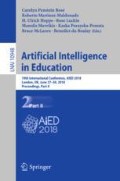Abstract
We present a systems thinking approach to help middle school students learn about diffusion processes in liquids using CTSiM, an open-ended learning environment. Students model and analyze the collision of individual particles, and then scale up the process to understand diffusion as an emergent behavior of particles. A classroom study shows that the intervention helped students achieve significant learning gains. We also observed synergistic learning of domain knowledge and computational thinking skills. To understand students’ problem-solving processes, we used a sequence mining algorithm to discover frequent activity patterns and link them to learning.
Access this chapter
Tax calculation will be finalised at checkout
Purchases are for personal use only
References
Barr, V., Stephenson, C.: Bringing computational thinking to k-12: what is involved and what is the role of the computer science education community? ACM Inroads 2(1), 48–54 (2011)
Basu, S., Biswas, G., Kinnebrew, J.S.: Learner modeling for adaptive scaffolding in a computational thinking-based science learning environment. User Model. User Adap. Inter. 27(1), 5–53 (2017)
Cheng, B.H., Ructtinger, L., Fujii, R., Mislevy, R.: Assessing systems thinking and complexity in science (large-scale assessment technical report 7). SRI International, Menlo Park (2010)
Chi, M.T.H.: Commonsense conceptions of emergent processes: why some misconceptions are robust. J. Learn. Sci. 14(2), 161–199 (2005)
Chi, M.T.H., Roscoe, R.D., Slotta, J.D., Roy, M., Chase, C.C.: Misconceived causal explanations for emergent processes. Cogn. Sci. 36(1), 1–61 (2012). https://doi.org/10.1111/j.1551-6709.2011.01207.x
Bransford, J.D., Brown, A.L., Cocking, R.R.: How People Learn: Brain, Mind, Experience, and School: Expanded Edition. The National Academies Press, Washington (2000)
Kinnebrew, J.S., Loretz, K.M., Biswas, G.: A contextualized, differential sequence mining method to derive students’ learning behavior patterns. J. Educ. Data Min. 5, 190–219 (2013)
Land, S.: Cognitive requirements for learning with open-ended learning environments. Educ. Tech. Res. Dev. 48(3), 61–78 (2000)
Sengupta, P., Kinnebrew, J.S., Basu, S., Biswas, G., Clark, D.: Integrating computational thinking with k-12 science education using agent-based computation: a theoretical framework. Educ. Inf. Technol. 18(2), 351–380 (2013). https://doi.org/10.1007/s10639-012-9240-x
Weintrop, D., Beheshti, E., Horn, M., Orton, K., Jona, K., Trouille, L., Wilensky, U.: Defining computational thinking for mathematics and science classrooms. J. Sci. Educ. Technol. 25(1), 127–147 (2016). https://doi.org/10.1007/s10956-015-9581-5
Wilensky, U.: NetLogo: Center for Connected Learning and Computer-Based Modeling. Northwestern University, Evanston, IL (1999)
Wilensky, U., Reisman, K.: Thinking like a wolf, a sheep, or a firefly: learning biology through constructing and testing computational theories an embodied modeling approach. Cogn. Instr. 24(2), 171–209 (2006)
Wilensky, U., Resnick, M.: Thinking in levels: a dynamic systems approach to making sense of the world. J. Sci. Educ. Technol. 8(1), 3–19 (1999). https://doi.org/10.1023/A:1009421303064
Wing, J.M.: Computational thinking. Commun. ACM 49(3), 33–35 (2006). https://doi.org/10.1145/1118178.1118215
Zhang, N., Biswas, G.: Assessing students computational thinking in a learning by modeling environment. In: Conference Proceedings of International Conference on Computational Thinking Education 2017, pp. 11–16 (2017)
Zhang, N., Biswas, G., Dong, Y.: Characterizing students’ learning behaviors using unsupervised learning methods. In: André, E., Baker, R., Hu, X., Rodrigo, M.M.T., du Boulay, B. (eds.) AIED 2017. LNCS (LNAI), vol. 10331, pp. 430–441. Springer, Cham (2017). https://doi.org/10.1007/978-3-319-61425-0_36
Acknowledgment
This work has been supported by NSF Cyberlearning Grant #1441542.
Author information
Authors and Affiliations
Corresponding author
Editor information
Editors and Affiliations
Rights and permissions
Copyright information
© 2018 Springer International Publishing AG, part of Springer Nature
About this paper
Cite this paper
Zhang, N., Biswas, G. (2018). Understanding Students’ Problem-Solving Strategies in a Synergistic Learning-by-Modeling Environment. In: Penstein Rosé, C., et al. Artificial Intelligence in Education. AIED 2018. Lecture Notes in Computer Science(), vol 10948. Springer, Cham. https://doi.org/10.1007/978-3-319-93846-2_76
Download citation
DOI: https://doi.org/10.1007/978-3-319-93846-2_76
Published:
Publisher Name: Springer, Cham
Print ISBN: 978-3-319-93845-5
Online ISBN: 978-3-319-93846-2
eBook Packages: Computer ScienceComputer Science (R0)

